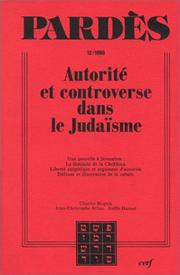| Listing 1 - 10 of 2147 | << page >> |
Sort by
|
Book
ISSN: 07682379 ISBN: 9782130817710 2130817718 Year: 2021 Publisher: Paris: PUF,
Abstract | Keywords | Export | Availability | Bookmark
 Loading...
Loading...Choose an application
- Reference Manager
- EndNote
- RefWorks (Direct export to RefWorks)
Pluriel et ancré dans son histoire, le judaïsme n'en obéit pas moins à une loi, la torah, dont le développement est soumis aux époques et aux régions qu'elle croise. Les huit siècles couverts ici sont ceux du glissement du judaïsme des prêtres à celui des chrétiens et des rabbins, du judaïsme de Palestine à celui de Diaspora. À la suite notamment de l'échec des révoltes contre Rome, il a fallu à ce peuple forgé dans la persécution et la déportation, qui ne reconnaît d'autre dieu que le sien, affirmer mais aussi - bien plus qu'on ne le pense - adapter son identité. Dans cette somme sur le judaïsme ancien qui noue l'histoire politique et l'histoire religieuse, il apparaît évident que l'évolution de la « religion » judéenne - juive -, mais aussi de la culture et de la société qui en découlent, n'est pas le produit d'une autarcie. Le judaïsme, au fur et à mesure, s'est moulé dans les éoques qu'il a traversées, a évolué avec elles et les différentes cultures qui l'ont constitué. Cette histoire antique y est décryptée dans une étude qui fera date pour tous ceux qui cherchent à comprendre réellement les racines d'un judaïsme bien moins figé que l'historiographie ne l'a laissé transparaître jusqu'ici.
Book
ISBN: 3895088552 9783895088551 Year: 1997 Publisher: Köln: Könemann,
Abstract | Keywords | Export | Availability | Bookmark
 Loading...
Loading...Choose an application
- Reference Manager
- EndNote
- RefWorks (Direct export to RefWorks)
Book
ISBN: 2732834076 2732834076 9782732834078 9782732834078 Year: 2002 Publisher: Paris: De Vecchi,
Abstract | Keywords | Export | Availability | Bookmark
 Loading...
Loading...Choose an application
- Reference Manager
- EndNote
- RefWorks (Direct export to RefWorks)
Book
ISBN: 2130453902 Year: 2000 Publisher: Paris PUF
Abstract | Keywords | Export | Availability | Bookmark
 Loading...
Loading...Choose an application
- Reference Manager
- EndNote
- RefWorks (Direct export to RefWorks)

ISBN: 2204042404 Year: 1990 Publisher: Paris : Les Editions du Cerf,
Abstract | Keywords | Export | Availability | Bookmark
 Loading...
Loading...Choose an application
- Reference Manager
- EndNote
- RefWorks (Direct export to RefWorks)
Book
Year: 1951 Publisher: Paris : Presses Universitaires de France,
Abstract | Keywords | Export | Availability | Bookmark
 Loading...
Loading...Choose an application
- Reference Manager
- EndNote
- RefWorks (Direct export to RefWorks)
Book
ISBN: 9781463243333 Year: 2021 Publisher: Piscataway : Gorgias Press,
Abstract | Keywords | Export | Availability | Bookmark
 Loading...
Loading...Choose an application
- Reference Manager
- EndNote
- RefWorks (Direct export to RefWorks)
The investigation of this book into early Jewish experiences of God begins with calls to discard any categorical and definitional approaches to the literature of early Judaism, and several enduring preconceptions about its mysticism and theology (particularly the relegation of its mysticism to particular texts and themes, and the molding of its theology in the image of medieval and post-medieval Jewish and Christian monotheisms). With this abandonment, the symbolic language of early Jewish texts gives sharper contours to a pre-formal theology, a theology in which God and divinity are more subjects of experience and recognition than of propositions. This clarity leads the investigation to the conclusion that early Judaism is thoroughly mystical and experiences a theology which is neither polytheistic, nor monotheistic, but deificational: there is only one divine selfhood, the divinity of "God," but he shares his selfhood with "gods," to varying degrees and always at his discretion. With some important differentiations which are also introduced here, this theology undergirds almost the entirety of early Judaism-the Bible, post-biblical texts, and even classical rabbinic literature. The greatest development over time is only that the boundaries between God and gods become at once clearer and less rigid
Book
Year: 1932 Publisher: Paris : Bloud et Gay,
Abstract | Keywords | Export | Availability | Bookmark
 Loading...
Loading...Choose an application
- Reference Manager
- EndNote
- RefWorks (Direct export to RefWorks)
Book
Year: 1879 Publisher: Paris : Alphonse Lemerre,
Abstract | Keywords | Export | Availability | Bookmark
 Loading...
Loading...Choose an application
- Reference Manager
- EndNote
- RefWorks (Direct export to RefWorks)
Book
Year: 1977 Publisher: Paris : Buchet/Chastel,
Abstract | Keywords | Export | Availability | Bookmark
 Loading...
Loading...Choose an application
- Reference Manager
- EndNote
- RefWorks (Direct export to RefWorks)
| Listing 1 - 10 of 2147 | << page >> |
Sort by
|

 Search
Search Feedback
Feedback About UniCat
About UniCat  Help
Help News
News